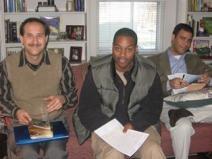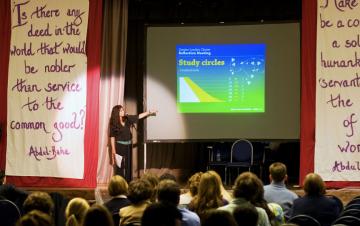Location
Cluster Reflection meetings are an important part of Baha’i community life now, but depending on the community you live in, attendance can sometimes be low and it’s still something many communities are learning about, so I thought it would be interesting to look at the importance of these meetings and why we should make an effort to attend.
Plan. Act. Reflect. Repeat.
Farzam Arbab, in the foreword of ‘Learning About Growth’, states:
The sharing of experience is extremely valuable. Reflection on the dynamics of the efforts of others yields insights into the causes of crisis and victory in one’s own endeavors.1
The value of reflection is indisputable. As Baha’is and as a community however, its value requires more than mere acknowledgement: Reflection is one of the fundamental principles underlying the mode in which we operate.
In the document Farzam Abab prefaced with the abovementioned words, the story of the Colombian Baha’i community and their efforts to achieve large-scale expansion is told. It tells of their humble beginnings, their journey to bring about growth and the subsequent evolution of the Ruhi Institute.
Of their role as teachers and administrators of the Faith, it is described that, “the most they could expect from themselves was to engage wholeheartedly in an intensive plan of action and an accompanying process of reflection and consultation.”2
Over time, the process of action accompanied by reflection and consultation became their method of learning and service, giving rise to the eventual development of course and educational materials that we now refer to as the Ruhi Books. It is hard to imagine that something as comprehensive and powerful as the Ruhi Institute process could have been developed through anything less than a set of ideas put into practice, subjected to reflection and consultation, and then further modified.
Similarly, in our own efforts to reach out to the wider community, we operate in a cyclic – though not linear – modus. As the Universal House of Justice describes, a community ideally grows through three-month cycles of activity:
…the burst of expansion experienced as a result of intense action; the necessary period of consolidation during which increases in ranks are fortified; and the opportunities designated for all to reflect and plan.3
Each stage of the cycle – expansion, consolidation, reflection and planning – is equally important, leading to the enhancement of the next and the effectiveness of the whole. The stage of reflection is to not only celebrate our accomplishments, but to analyze our challenges and learn from both to inform our plans for the next cycle.
Key to the progress of an intensive program of growth is the phase dedicated to reflection, in which the lessons learned in action are articulated and incorporated into plans for the next cycle of activity. Its principal feature is the reflection meeting — as much a time of joyous celebration as it is of serious consultation.4
Having a voice, having a choice
In the 2013 Ridvan Message, the Universal House of Justice stated:
Gatherings for reflection are increasingly seen as occasions where the community’s efforts, in their entirety, are the subject of earnest and uplifting deliberation.5
This description in no way excludes members of a community who are not formally registered Baha’is. The purpose of a cluster reflection meeting is to deliberate on the affairs of a community and as such, all members of the respective community are encouraged to participate.
To see the purpose of a cluster reflection meeting is to see its potential. For instance, a friend attending a cluster reflection meeting in an area of Nepal explained that some 300 people attended while only around five of the attendees were declared Baha’is. In Toronto, Canada as well, as seen in the film Frontiers of Learning released by the Universal House of Justice, reflection meetings are held on a neighborhood level to more acutely address the needs of a particular community.
Whether you are a child attending a neighborhood children’s class, a junior youth supporting a local group’s service project, a participant in a study circle or an individual believer not involved in any formal core activity – the cluster reflection meeting is a space in which you can become an active protagonist in your community.
In Insights into the Frontiers of Learning – a document released to supplement the aforementioned film – particular mention is given to the increased capacity in formerly underrepresented population groups, such as women and girls:
Women and girls have gained increased confidence by initiating core activities and are having a greater voice in community affairs through participation in reflection meetings and other gatherings.6
While individual capacity is built through the educational process offered by the Baha’is, so too can a community’s capacity be built by providing collective spaces in which voices are heard. For action to be collaborative, the forum that gives rise to it must be participatory.
Greater than the sum of its parts
The value in reflecting as a greater whole becomes clearer as we understand both its practical and spiritual implications.
When following the narrative of the Colombian community, the importance of collective reflection becomes apparent:
The purpose of joint reflection was to seek in the unfathomable depths of the ocean of Revelation the answers to questions, challenges, and problems and to discover the next steps in a path that, if trodden with absolute faith, would lead to unprecedented expansion.7
We also see the necessity for collective reflection in the Insights into the Frontiers of Learning document:
As with other structures in the cluster, the means for planning and reflection has also developed organically, becoming more organized, systematic, and varied as complexity has grown. Initial informal interactions […] eventually give rise to a cluster reflection meeting and to other formal and informal occasions for reflection.8
How then should a reflection gathering look and what form should it take? Again, we look to the Universal House of Justice for guidance:
[In] Gatherings for reflection…participants learn what has been accomplished overall, understand their own labours in that light, and enhance their knowledge about the process of growth by absorbing the counsels of the institutions and drawing on the experience of their fellow believers.9
Careful analysis of experience, through participatory discussions rather than overly complex and elaborate presentations, serves to maintain unity of vision, sharpen clarity of thought and heighten enthusiasm. Central to such an analysis is the review of vital statistics that suggest the next set of goals to be adopted. Plans are made that take into account increased capacity in terms of the human resources available at the end of the cycle to perform various tasks, on the one hand, and accumulated knowledge about the receptivity of the population and the dynamics of teaching, on the other.10
However, as mentioned in the Insights from the Frontiers of Learning document, we should also not lose sight of the intended purpose of a reflection meeting:
Reflection meetings sometimes centred too much on planning or instruction rather than the opportunity to learn from experience and revise action accordingly.11
Above all, regular reflection gives us an opportunity both as individuals and as a community, to “make each morrow richer than its yesterday” and where we fall short – to try again.
- Learning About Growth, p. 14 [↩]
- “Learning About Growth”, page 14 [↩]
- UHJ Message 12th December 2011, Universal House of Justice [↩]
- Message to the Conference of the Continental Board of Counsellors, 27 December 2005 [↩]
- The Universal House of Justice, 2013 Ridvan Message [↩]
- Insights into the Frontiers of Learning, p. 8 [↩]
- Learning About Growth, page 14 [↩]
- Insights from the Frontiers of Learning, p. 13 [↩]
- Ridvan Message 2013, Universal House of Justice [↩]
- Message to the Conference of the Continental Board of Counsellors, 27 December 2005 [↩]
- Insights from the Frontiers of Learning, p. 14 [↩]
BAHA'I REFLECTION MEETINGSCOMMUNITY DEVELOPMENTCONSULTATIONCORE ACTIVITIESINSTITUTE PROCESS
- See more at: http://bahaiblog.net/site/2014/12/cluster-reflection-meeting-plan-act-re...

